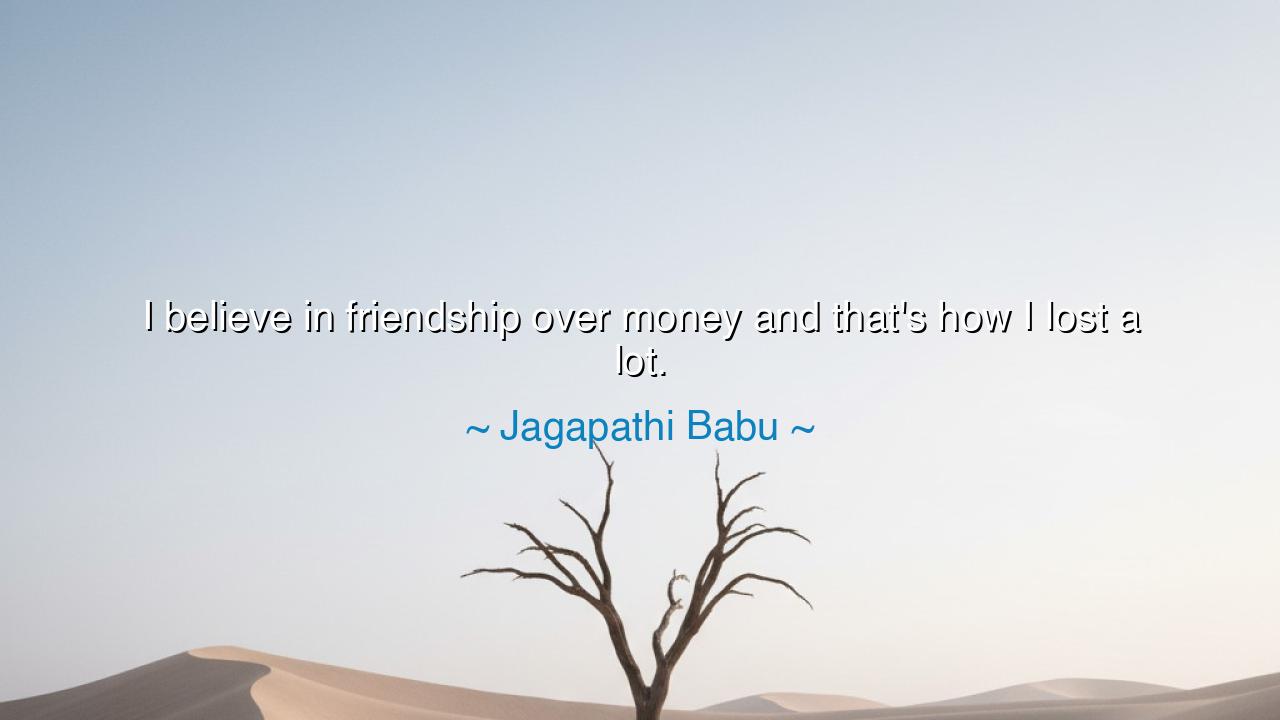
I believe in friendship over money and that's how I lost a lot.






"I believe in friendship over money and that's how I lost a lot." These words, spoken by Jagapathi Babu, carry the weight of a profound and timeless truth that transcends the modern world and echoes through the corridors of history. In them, he reveals the eternal struggle between the values that define us and the material temptations that seek to pull us away from what is truly important. Friendship—that sacred bond between souls—is, in the eyes of Jagapathi Babu, far more precious than the fleeting riches that the world offers. But this belief, he admits, has come at a cost. How often, in the pursuit of loyalty and trust, have we made sacrifices that seem to set us back? How many times have we chosen companionship over wealth, only to find that the scales of life do not always tip in our favor?
In the ancient world, the tension between friendship and money was a familiar one, as it is today. The great philosopher Aristotle spoke at length of friendship in his Nicomachean Ethics, asserting that it was one of the highest virtues, a bond forged not by necessity or profit, but by shared values and a mutual respect for one another’s character. Yet, even Aristotle understood that such a friendship often comes at a price. The love of wealth and the pursuit of personal gain have long been seen as a distraction from the higher pursuits of virtue and honor. To choose friendship over money is to choose a more difficult path, one that may lead to loss in material terms, but to gain in spiritual and emotional wealth.
Consider the tale of Socrates, the great philosopher of Athens, who, when offered wealth and power by the rulers of his city, chose instead the life of a humble teacher. Socrates understood that the true measure of a man’s worth was not found in his possessions, but in his character and the relationships he fostered. His decision to value friendship over money led to his ultimate demise—his refusal to accept the power and riches that could have saved him from his enemies was, in a sense, a sacrifice for the sake of his integrity and his bond with his followers. Socrates too "lost a lot," but in his eyes, his loss was not in material terms, but in the pursuit of something far more enduring—wisdom and the genuine connection with others.
Jagapathi Babu’s words also call to mind the story of Caius Marius, a Roman general who, though once a man of great wealth and success, ultimately lost everything for the sake of his friendships and political alliances. Marius, in his later years, aligned himself with the populares, the political faction that sought to advance the plebeians. In doing so, he alienated many of his former allies, including those who could have helped him maintain his wealth and power. Like Babu, Marius chose friendship and loyalty over the pursuit of wealth, and his eventual downfall is a testament to the difficulty of that choice. Marius lost not just material wealth, but his reputation and his influence, all for the sake of his values and his bonds with others.
Yet, the wisdom we glean from these stories is not that friendship and money are incompatible, but that the heart of a person cannot be bought. Jagapathi Babu, like Socrates and Marius, teaches us that true friendship transcends the need for material gain. To choose friendship over money is to choose something far more lasting and meaningful. It is to choose integrity, loyalty, and the deep connection between souls that money can never replace. Friendship, in this light, is not a mere exchange; it is a bond that enriches both parties, a mutual investment in each other's well-being and growth.
However, the lesson is clear: to live by the values of friendship over money is a path of both joy and sacrifice. The sacrifice is real, as Jagapathi Babu openly admits. We may lose material wealth, opportunities, or even status when we choose to place others before ourselves, but what we gain is far more profound. The wealth of trust, loyalty, and shared experiences is something that money can never purchase. And so, we are reminded that while money can offer comforts and security, it is friendship that enriches the soul, that provides the kind of wealth that endures beyond the limits of time.
Practical wisdom, then, lies in how we live our lives today. Let us remember that in every choice we make, there is a balance to be found between material success and the deeper, more enduring bonds of friendship. Seek not to gain the world at the cost of your connections with others, for true wealth lies in the relationships we cultivate, in the loyalties we honor, and in the friendships we cherish. As we walk this path, let us hold fast to the belief that, while money may be fleeting, the bonds of friendship are eternal.






AAdministratorAdministrator
Welcome, honored guests. Please leave a comment, we will respond soon